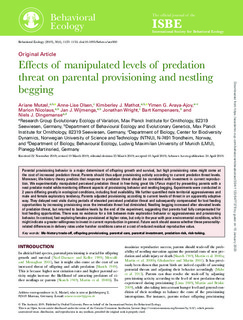| dc.contributor.author | Mutzel, Ariane | |
| dc.contributor.author | Olsen, Anne-Lise | |
| dc.contributor.author | Mathot, Kimberley J | |
| dc.contributor.author | Araya-Ajoy, Yimen | |
| dc.contributor.author | Nicolaus, Marion | |
| dc.contributor.author | Wijmenga, Jan J | |
| dc.contributor.author | Wright, Jonathan | |
| dc.contributor.author | Kempenaers, Bart | |
| dc.contributor.author | Dingemanse, Niels J. | |
| dc.date.accessioned | 2020-01-16T10:33:25Z | |
| dc.date.available | 2020-01-16T10:33:25Z | |
| dc.date.created | 2019-12-18T10:04:34Z | |
| dc.date.issued | 2019 | |
| dc.identifier.citation | Behavioral Ecology. 2019, 30 (4), 1123-1135. | nb_NO |
| dc.identifier.issn | 1045-2249 | |
| dc.identifier.uri | http://hdl.handle.net/11250/2636618 | |
| dc.description.abstract | Parental provisioning behavior is a major determinant of offspring growth and survival, but high provisioning rates might come at the cost of increased predation threat. Parents should thus adjust provisioning activity according to current predation threat levels. Moreover, life-history theory predicts that response to predation threat should be correlated with investment in current reproduction. We experimentally manipulated perceived predation threat in free-living great tits (Parus major) by presenting parents with a nest predator model while monitoring different aspects of provisioning behavior and nestling begging. Experiments were conducted in 2 years differing greatly in ecological conditions, including food availability. We further quantified male territorial aggressiveness and male and female exploratory tendency. Parents adjusted provisioning according to current levels of threat in an apparently adaptive way. They delayed nest visits during periods of elevated perceived predation threat and subsequently compensated for lost feeding opportunities by increasing provisioning once the immediate threat had diminished. Nestling begging increased after elevated levels of predation threat, but returned to baseline levels by the end of the experiment, suggesting that parents had fully compensated for lost feeding opportunities. There was no evidence for a link between male exploration behavior or aggressiveness and provisioning behavior. In contrast, fast-exploring females provisioned at higher rates, but only in the year with poor environmental conditions, which might indicate a greater willingness to invest in current reproduction in general. Future work should assess whether these personality-related differences in delivery rates under harsher conditions came at a cost of reduced residual reproductive value. | nb_NO |
| dc.language.iso | eng | nb_NO |
| dc.publisher | Oxford University Press | nb_NO |
| dc.rights | Navngivelse 4.0 Internasjonal | * |
| dc.rights.uri | http://creativecommons.org/licenses/by/4.0/deed.no | * |
| dc.title | Effects of manipulated levels of predation threat on parental provisioning and nestling begging | nb_NO |
| dc.type | Journal article | nb_NO |
| dc.type | Peer reviewed | nb_NO |
| dc.description.version | publishedVersion | nb_NO |
| dc.source.pagenumber | 1123-1135 | nb_NO |
| dc.source.volume | 30 | nb_NO |
| dc.source.journal | Behavioral Ecology | nb_NO |
| dc.source.issue | 4 | nb_NO |
| dc.identifier.doi | 10.1093/beheco/arz060 | |
| dc.identifier.cristin | 1762333 | |
| dc.relation.project | Norges forskningsråd: 223257 | nb_NO |
| dc.description.localcode | © The Author(s) 2019. Published by Oxford University Press on behalf of the International Society for Behavioral Ecology. This is an Open Access article distributed under the terms of the Creative Commons Attribution License (http://creativecommons.org/licenses/by/4.0/), which permits unrestricted reuse, distribution, and reproduction in any medium, provided the original work is properly cited. https://doi.org/10.1093/beheco/arz060 | nb_NO |
| cristin.unitcode | 194,66,10,0 | |
| cristin.unitname | Institutt for biologi | |
| cristin.ispublished | true | |
| cristin.fulltext | original | |
| cristin.qualitycode | 2 | |

